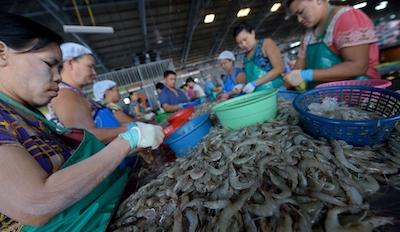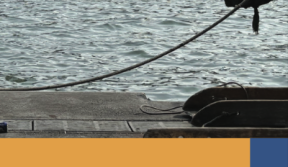
The Seafood Working Group (SWG) is a global coalition of human rights, labor and environmental organizations that work together to develop and advocate for effective government policies and industry actions to end the related problems of labor exploitation, illegal fishing and overfishing in the international seafood trade. Founded in 2014 together with the support of Humanity United, the SWG is convened by Global Labor Justice - International Labor Rights Forum (GLJ-ILRF) and is led by an Advisory Body of leading organizations in these fields.
The impetus for the SWG is our understanding that labor exploitation is often integrally linked to illegal and unsustainable practices in the seafood industry. Our membership includes environmental groups which have spent decades campaigning for practices that protect marine environments, and possess knowledge that can support campaigns for just working conditions and vice versa. It is only by working together, with environmental, human rights, and labor organizations each contributing based on their unique expertise, that comprehensive solutions can be developed to fundamentally move the seafood sector towards more sustainable, rights-respecting practices.
Guiding Principles
- Educate, engage, and hold governments and corporations accountable for ensuring internationally-recognized labor standards and to adopt and progressively implement new standards where there are gaps.
- Promote advocacy agendas that are grounded in the priorities of workers, trade unions and worker-led organizations on the frontlines.
- Foster cooperation to find solutions to labor, social, and environmental issues in the seafood industry through consensus-building, collaboration and partnership.
- Promote best practices to end illegal, unreported and unregulated (IUU) fishing and overfishing, and ensure good governance of oceans and protection of oceans and marine life.
Advisory Body
The Working Group is led by an advisory body of leading labor, human rights and environmental organizations that help determine the strategic advocacy priorities of the coalition and guide its expansion to support workers in the seafood industry throughout Asia. The current members of the Advisory Body are:
- Kelley K. Bell, FishWise
- Ashley Aarons, Oxfam USA
- Juno Fitzpatrick, Conservation International
- Laura Gutierrez, The American Federation of Labor and Congress of Industrial Organizations
- Rossen Karavatchev, International Transport Workers’ Federation
- Phil Robertson, Human Rights Watch
- Valery Alzaga, Global Labor Justice - International Labor Rights Forum
- Ame Sagiv and Sarah Mount, Humanity United, and The Freedom Fund
- Steve Trent, Environmental Justice Foundation
- David John Welsh and Alex Feltham, Solidarity Center
- Lennon Ying-Dah Wong, Serve the People Association (SPA), Taoyuan
- Sari Heidenreich, Greenpeace USA
Members
- Be Slavery Free
- Business & Human Rights Resource Centre
- Conservation International
- Deep Sea Fishermen’s Union
- Destructive Fishing Watch (DFW) Indonesia
- Environmental Justice Foundation
- Ethical Trading Initiative
- FishWise
- The Freedom Fund
- Freedom United
- Global Labor Justice - International Labor Rights Forum
- Greenpeace USA
- Green America
- Human Rights and Development Foundation
- Human Rights at Sea
- Human Rights Watch
- Human Trafficking Legal Center (HTLC)
- Humanity United
- Humanity United Action
- International Pole & Line Foundation
- Lawyers’ Rights Watch Canada
- Migrant Workers Rights Network
- Oceana
- Oxfam
- Serve the People Association (SPA), Taoyuan
- Solidarity Center
- State Enterprise Workers’ Relations Confederation
- Sustainability Incubator
- Taiwan Association for Human Rights (TAHR)
- Verité
- World Wildlife Fund (WWF)
- Yilan Migrant Fishermen Union (YMFU)
The Working Group has produced several significant outcomes in its six years, including:
- Coordinated successful international effort that stopped the Thai government from pursuing a plan to use prison labor on fishing vessels. (Victory at Sea!)
- Contributed to policy advocacy that led the Thai government to be the first in Asia to ratify the ILO Protocol of 2014 to the Forced Labor Convention as well as the ILO Convention on Work in Fishing No. 188.
- Launched the Independent Monitoring at Sea (IM@Sea) project together with the Migrant Worker Rights Network (MWRN) to address vulnerabilities of migrant workers in the Thai fishing fleet by enabling worker connectivity while at sea, improving forced labor risk assessments, and developing a worker-driven grievance mechanism.
- Through the IM@Sea project, developed the “Essential Elements of Effective Social Responsibility in the Seafood Sector” for any actor seeking to build an effective human rights compliance program.
- Led international advocacy efforts to end the use of Strategic Lawsuits Against Public Participation Lawsuits (SLAPP) by the government and companies in Thailand.


